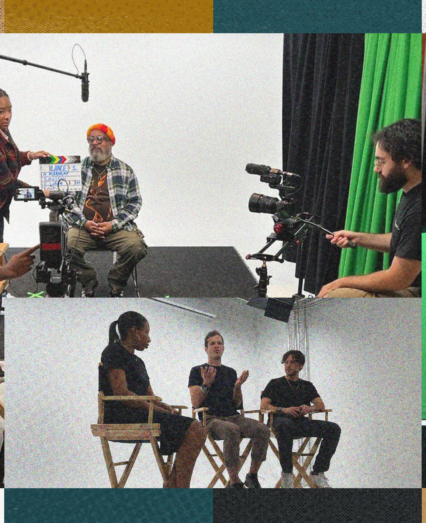As you probably (hopefully) know already, February is Black History Month. Many of us are celebrating, some are taking the time to educate themselves or others, and at the very least, you’ve probably seen some variation of the month-long observance posted on your social feed. You may be wondering: how much does this actually matter? Or, do these Instagram accounts really care? Should I be posting something for Black History Month?
For those of you reading this who aren’t Black, I have just one piece of advice to offer: forget the posts, and focus on your allyship.
Every day of the year (not solely in February), it’s crucial to be a genuine ally to your Black friends, neighbors, and coworkers—but this is as good a time as any to start if you haven’t yet. As a Black woman in marketing, I have a pretty good handle on what isn’t genuine allyship; and as an Eritrean who grew up in Oakland, CA, I have a rooted understanding of what is genuine. So let’s get down to it: Genuine allyship is a partnership that is active instead of reactive to ongoing issues.
A person who is an ally with advantages collaborates and works in solidarity with a marginalized group to undermine the structures that obstruct that group’s access to basic rights, opportunities, and success in our society. Allyship is a proactive, ongoing, necessary, and an extraordinarily challenging practice of unlearning and re-evaluating.
Now, let’s talk about how brands/businesses can be allies. Real allies. As you all know, marketing is a powerful force in our society; however, brands should be cautious about the messages they push out. Not everything needs to be an opportunity for your brand to speak up. When businesses jump on the marketing bandwagon to propagandize specific holidays or movements that “honor” a group of people’s struggle for their own personal gains, it’s not only deleterious, but could have a long-term negative impact on your brand’s reputation.
People aren’t naive when it comes to inauthentic behaviors, especially from big brands. When businesses like WALMART have Juneteenth marketing campaigns that are performative, they’ll get called out for it quick. It’s important that brands/businesses move away from these performative behaviors (i.e. blanket statements, shallow social posts during Black holidays that are insensitive and inconsistent with the brand, vague corporate commitments to support the Black community, emphasizing DEI efforts rather than amplifying Black voices within the company, and so on—you can read even more in our 2020 blog on how to avoid performative activism on social media) because it’s not genuine, it’s highly offensive, and it does more damage than good.
Luckily for me, ChatterBlast has given myself and a few others the creative freedom to explore uncomfortable but necessary topics this month, such as allyship and reparations—which has been an unreal experience. Rarely have I been given an opportunity from a company, particularly in advertising, to share my voice on issues such as this.
Creating space for Black people to speak their minds is just one of several ways you can focus your allyship as a business instead of simply slapping a #BlackHistoryMonth tag to your posts then moving on. Here are several tips on how to stand out as a true ally:
Educate Yourself
Learn and unlearn
Immerse yourself in the history of marginalized groups by reading, researching, and understanding their struggle. Talk to the people impacted and listen to their stories, concerns, and needs. More importantly, work toward some actionable goals of positive impact. To start, I recommend exploring the work of Angela Davis, Heather McGhee, and Cornel West.
Representation Matters
Hire more Black people
According to Statista, African Americans make up nearly 12% of the marketing industry, but career experts at Zippia state that only 3.8% of Chief Executive Officers are Black or African American. Having Black people in your companies allows for our voices and thoughts to be well represented and a part of overall conversations (like this!).
Increase Salary
Contribute to closing the racial wealth gap
Stemming from the colonial period, the racial wealth gap is a financial phenomenon that documents how infrastructural discrimination continues to set back African Americans. According to McKinsey & Company, there was a $200 billion yearly imbalance between Black and White salaries in 2021. Inequalities like this lead to a decrease in quality of life, affecting one’s health and safety, which subsequently affects work-life balance. The racial wealth gap will not close anytime soon unless changes start happening now.
Reassess Company Culture/Practices
Shift company culture to support Black employees
According to CNBC, it’s important to have a diverse workplace, but to bring the goodness out of diversity is to emphasize inclusion. Inclusion is what gives Black people a sense of safety so they can feel free to express their thoughts and be their genuine selves. Furthermore, addressing company practices requires systemic reform, an analysis of our larger society, and active cooperation between businesses and other stakeholders.
All in all, I ask brands/businesses to move with care and good intent, rather than rush to be part of a “trending” cultural issue/topic/conversation/month. More racial and social equity issues are bound to surface, so please make sure to do the work of a genuine ally and avoid performative allyship. Ensure your messaging mirrors your business’ internal culture and infrastructure. And remember two things, if anything:
- To be an ally is to be active and not reactive to issues.
- Not all things are your hashtag to claim.



